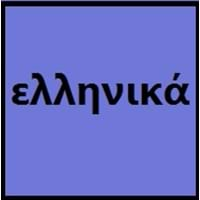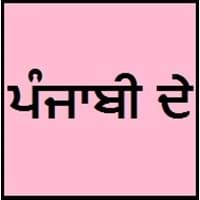Countries
Cyprus, European Union, Greece
India, Pakistan
National Language
Albania, Cyprus, Egypt, France, Greece, Italy, Romania, Turkey, Ukraine
India, Pakistan
Second Language
Roman Empire
Pakistan
Speaking Continents
Asia, Europe
Asia
Minority Language
Albania, Armenia, Australia, Hungary, Italy, Romania, Turkey, Ukraine
Australia, Canada, United Kingdom, United States of America
Regulated By
Center for the Greek language (Κέντρον Ελληνικής Γλώσσας)
Not Available
Interesting Facts
- Greek is the longest documented language of all the Indo-European Langauges.
- The official language of education in the Roman Empire was Greek.
- Punjabi is 2nd most spoken in United Kingdom and 4th most spoken in Canada.
- Punjabi is tonal language, by using various tones Punjabi speakers are able to differentiate between words.
Similar To
Armenian
Hindi Language
Derived From
Latin
Sanskrit Language
Alphabets in
Greek-Alphabets.jpg#200
Punjabi-Alphabets.jpg#200
Scripts
Arabic, Latin
Gurmukhi, Shahmukhi
Writing Direction
Left-To-Right, Horizontal
Left-To-Right, Horizontal
Hello
γεια σας (geia sas)
ਨਮਸਕਾਰ (namaskar)
Thank You
ευχαριστώ (ef̱charistó̱)
ਸ਼ੁਕਰੀਆ (shukrīā)
How Are You?
πώς είσαι (pó̱s eísai)
ਤੁਹਾਡਾ ਕੀ ਹਾਲ ਹੈ? (tuhāḍā kī hāl he?)
Good Night
Καληνυχτα (Kali̱nychta)
ਸ਼ੁੱਭ ਰਾਤਰੀ (shubh rātri)
Good Evening
καλησπέρα (kali̱spéra)
ਸਤ ਸੀ੍ ਅਕਾਲ (Sat sri akaal)
Good Afternoon
Καλὸ ἀπόγευμα (Kaló apóyevma)
ਨਮਸਕਾਰ (Namasakāra)
Good Morning
καλημέρα (kali̱méra)
ਸਤ ਸੀ੍ ਅਕਾਲ (Sat sri akaal)
Please
παρακαλώ (parakaló̱)
ਕਿਰਪਾ ਕਰਕੇ (kirpā karkē)
Sorry
συγνώμη (sygnó̱mi̱)
ਖਿਮਾ/ਮਾਫ਼ ਕਰੋ ਜੀ। (kimā)
Bye
αντίο (antío)
ਫਿਰ ਮਿਲਾੰਗੇ (Fair milaange)
I Love You
Σε αγαπώ (Se agapó̱)
ਮੈਂ ਤੈਨੂੰ ਪਿਆਰ ਕਰਦਾ ਹਾਂ। (mẽ tenū̃ piār kardā hā̃)
Excuse Me
Με συγχωρείτε! (Me synhoríte)
ਵੇਖੋ ਜੀ। (vēkhō jī)
Dialect 1
Cappadocian Greek
Pothohari
Where They Speak
Greece
Pakistan
Where They Speak
Italy
Afganistan, India, Pakistan
Where They Speak
Ukraine
Pakistan, Punjab, India
Second Language Speakers
Not Available
Native Name
ελληνικά
ਪੰਜਾਬੀ, پنجابی
Alternative Names
Ellinika, Graecae, Grec, Greco, Neo-Hellenic, Romaic
Lahanda, Lahnda, Lahndi, Lahori, Majhi, Gurmukhi, Gurumukhi, Panjabi
French Name
grec moderne (après 1453)
pendjabi
German Name
Neugriechisch
Pandschabi-Sprache
Pronunciation
[eliniˈka]
Not Availble
Ethnicity
Greeks or Hellenes
Punjabis
Language Family
Indo-European Family
Indo-European Family
Subgroup
Hellenic
Indo-Iranian
Branch
Not Available
Indic
Early Forms
Proto-Greek, Mycenaean Greek, Ancient Greek, Koine Greek and Medieval Greek
Shauraseni, Kaikeyi
Standard Forms
Modern Greek
Modern Punjabi
Language Position
Not Available
Signed Forms
Greek Sign Language
Indian Signing System (ISS)
Scope
Individual
Not Available
ISO 639 6
ells
Not Available
Glottocode
gree1276
panj1256
Linguasphere
56-AAA-a
No data available
Language Type
Living
Not Available
Language Linguistic Typology
Subject-Verb-Object
Subject-Object-Verb
Language Morphological Typology
Fusional, Synthetic
Fusional
Greek and Punjabi Greetings
People around the world use different languages to interact with each other. Even if we cannot communicate fluently in any language, it will always be beneficial to know about some of the common greetings or phrases from that language. This is where Greek and Punjabi greetings helps you to understand basic phrases in Greek and Punjabi language. Greek word for "Hello" is γεια σας (geia sas) or Punjabi word for "Thank You" is ਸ਼ੁਕਰੀਆ (shukrīā). Find more of such common Greek Greetings and Punjabi Greetings. These greetings will help you to be more confident when conversing with natives that speak these languages.
Greek vs Punjabi Difficulty
The Greek vs Punjabi difficulty level basically depends on the number of Greek Alphabets and Punjabi Alphabets. Also the number of vowels and consonants in the language plays an important role in deciding the difficulty level of that language. The important points to be considered when we compare Greek and Punjabi are the origin, speaking countries, language family, different greetings, speaking population of these languages. Want to know in Greek and Punjabi, which language is harder to learn? Time required to learn Greek is 44 weeks while to learn Punjabi time required is 6 weeks.





